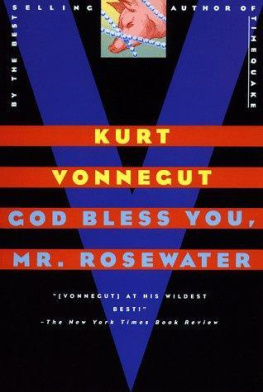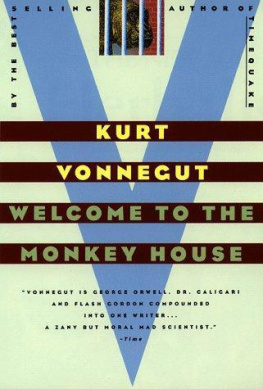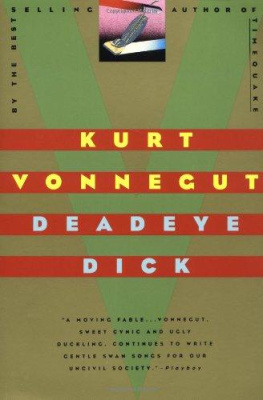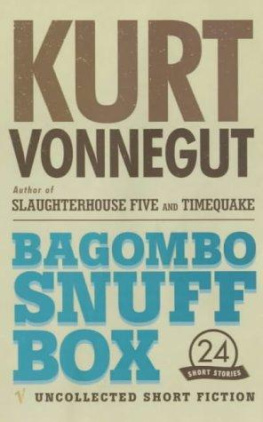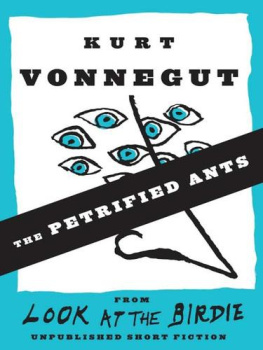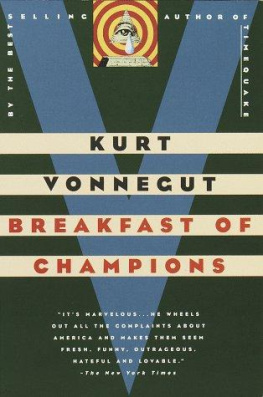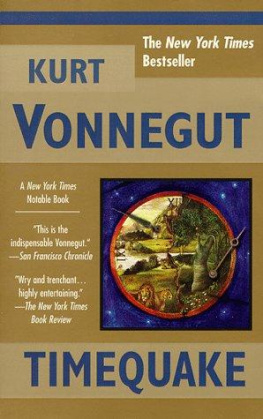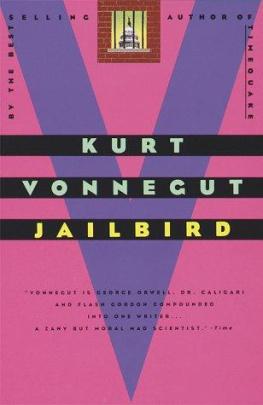Kurt Vonnegut - God bless you, Mr. Rosewater: or, Pearls before swine
Here you can read online Kurt Vonnegut - God bless you, Mr. Rosewater: or, Pearls before swine full text of the book (entire story) in english for free. Download pdf and epub, get meaning, cover and reviews about this ebook. year: 1965, publisher: Dell, genre: Art. Description of the work, (preface) as well as reviews are available. Best literature library LitArk.com created for fans of good reading and offers a wide selection of genres:
Romance novel
Science fiction
Adventure
Detective
Science
History
Home and family
Prose
Art
Politics
Computer
Non-fiction
Religion
Business
Children
Humor
Choose a favorite category and find really read worthwhile books. Enjoy immersion in the world of imagination, feel the emotions of the characters or learn something new for yourself, make an fascinating discovery.

- Book:God bless you, Mr. Rosewater: or, Pearls before swine
- Author:
- Publisher:Dell
- Genre:
- Year:1965
- Rating:4 / 5
- Favourites:Add to favourites
- Your mark:
- 80
- 1
- 2
- 3
- 4
- 5
God bless you, Mr. Rosewater: or, Pearls before swine: summary, description and annotation
We offer to read an annotation, description, summary or preface (depends on what the author of the book "God bless you, Mr. Rosewater: or, Pearls before swine" wrote himself). If you haven't found the necessary information about the book — write in the comments, we will try to find it.
God bless you, Mr. Rosewater: or, Pearls before swine — read online for free the complete book (whole text) full work
Below is the text of the book, divided by pages. System saving the place of the last page read, allows you to conveniently read the book "God bless you, Mr. Rosewater: or, Pearls before swine" online for free, without having to search again every time where you left off. Put a bookmark, and you can go to the page where you finished reading at any time.
Font size:
Interval:
Bookmark:
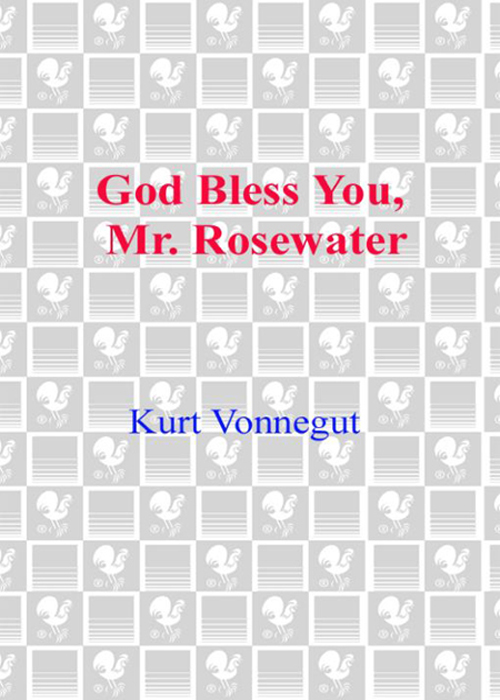
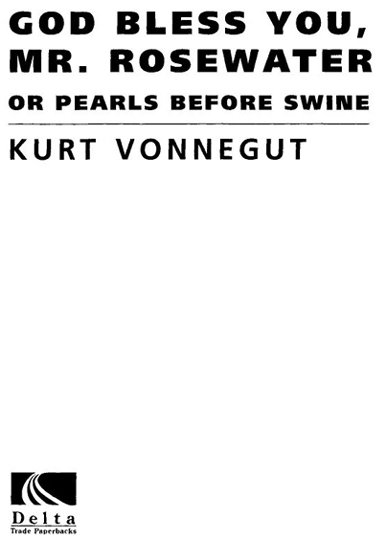
Table of Contents
For Alvin Davis,
the telepath,
the hoodlums friend
"The Second World War was overand there I was at high noon, crossing Times Square with a Purple Heart on."
ELIOT ROSEWATER President, The Rosewater Foundation
AMERICAS GREATEST SATIRIST KURT VONNEGUT IS...
"UNIQUE... one of the writers who map our landscapes for us, who give names to the places we know best."
DORIS LESSING
The New York Times Book Review
"OUR FINEST BLACK-HUMORIST.... We laugh in self-defense."
The Atlantic Monthly
"AN UNIMITATIVE AND INIMITABLE SOCIAL SATIRIST."
Harpers Magazine
"A MEDICINE MAN, CONJURING UP FANTASIES TO WARN THE WORLD."
The Charlotte Observer
"A CAUSE FOR CELEBRATION."
Chicago Sun-Times
"A LAUGHING PROPHET OF DOOM."
The New York Times
All persons, living and dead, are purely coincidental, and should not be construed.
A SUM OF MONEY is a leading character in this tale about people, just as a sum of honey might properly be a leading character in a tale about bees.
The sum was $87,472,033.61 on June 1, 1964, to pick a day. That was the day it caught the soft eyes of a boy shyster named Norman Mushari. The income the interesting sum produced was $3,500,000 a year, nearly $10,000 a daySundays, too.
The sum was made the core of a charitable and cultural foundation in 1947, when Norman Mushari was only six. Before that, it was the fourteenth largest family fortune in America, the Rosewater fortune. It was stashed into a foundation in order that tax-collectors and other predators not named Rosewater might be prevented from getting their hands on it. And the baroque masterpiece of legal folderol that was the charter of the Rosewater Foundation declared, in effect, that the presidency of the Foundation was to be inherited in the same manner as the British Crown. It was to be handed down throughout all eternity to the closest and oldest heirs of the Foundation's creator, Senator Lister Ames Rosewater of Indiana.
Siblings of the President were to become officers of the Foundation upon reaching the age of twenty-one. All officers were officers for life, unless proved legally insane. They were free to compensate themselves for their services as lavishly as they pleased, but only from the Foundation's income.

As required by law, the charter prohibited the Senator's heirs having anything to do with the management of the Foundation's capital. Caring for the capital became the responsibility of a corporation that was born simultaneously with the Foundation. It was called, straightforwardly enough, The Rosewater Corporation. Like almost all corporations, it was dedicated to prudence and profit, to balance sheets. Its employees were very well paid. They were cunning and happy and energetic on that account. Their main enterprise was the churning of stocks and bonds of other corporations. A minor activity was the management of a saw factory, a bowling alley, a motel, a bank, a brewery, extensive farms in Rosewater County, Indiana, and some coal mines in northern Kentucky.
The Rosewater Corporation occupied two floors at 500 Fifth Avenue, in New York, and maintained small branch offices in London, Tokyo, Buenos Aires and Rosewater County. No member of the Rosewater Foundation could tell the Corporation what to do with the capital. Conversely, the Corporation was powerless to tell the Foundation what to do with the copious profits the Corporation made.

These facts became known to young Norman Mushari when, upon graduating from Cornell Law School at the top of his class, he went to work for the Washington, D.C., law firm that had designed both the Foundation and the Corporation, the firm of McAllister, Robjent, Reed and McGee. He was of Lebanese extraction, the son of a Brooklyn rug merchant. He was five feet and three inches tall. He had an enormous ass, which was luminous when bare.
He was the youngest, the shortest, and by all odds the least Anglo-Saxon male employee in the firm. He was put to work under the most senile partner, Thurmond McAllister, a sweet old poop who was seventy-six. He would never have been hired if the other partners hadn't felt that McAllister's operations could do with just a touch more viciousness.
No one ever went out to lunch with Mushari. He took nourishment alone in cheap cafeterias, and plotted the violent overthrow of the Rosewater Foundation. He knew no Rosewaters. What engaged his emotions was the fact that the Rosewater fortune was the largest single money package represented by McAllister, Robjent, Reed and McGee. He recalled what his favorite professor, Leonard Leech, once told him about getting ahead in law. Leech said that, just as a good airplane pilot should always be looking for places to land, so should a lawyer be looking for situations where large amounts of money were about to change hands.
"In every big transaction," said Leech, "there is a magic moment during which a man has surrendered a treasure, and during which the man who is due to receive it has not yet done so. An alert lawyer will make that moment his own, possessing the treasure for a magic microsecond, taking a little of it, passing it on. If the man who is to receive the treasure is unused to wealth, has an inferiority complex and shapeless feelings of guilt, as most people do, the lawyer can often take as much as half the bundle, and still receive the recipient's blubbering thanks."
The more Mushari rifled the firm's confidential files relative to the Rosewater Foundation, the more excited he became. Especially thrilling to him was that part of the charter which called for the immediate expulsion of any officer adjudged insane. It was common gossip in the office that the very first president of the Foundation, Eliot Rosewater, the Senator's son, was a lunatic. This characterization was a somewhat playful one, but as Mushari knew, playfulness was impossible to explain in a court of law. Eliot was spoken of by Mushari's co-workers variously as "The Nut," "The Saint," "The Holy Roller," "John the Baptist," and so on.
"By all means," Mushari mooned to himself, "we must get this specimen before a judge."
From all reports, the person next in line to be President of the Foundation, a cousin in Rhode Island, was inferior in all respects. When the magic moment came, Mushari would represent him.
Mushari, being tone-deaf, did not know that he himself had an office nickname. It was contained in a tune that someone was generally whistling when he came or went. The tune was "Pop Goes the Weasel."
Eliot Rosewater became President of the Foundation in 1947. When Mushari began to investigate him seventeen years later, Eliot was forty-six. Mushari, who thought of himself as brave little David about to slay Goliath, was exactly half his age. And it was almost as though God Himself wanted little David to win, for confidential document after document proved that Eliot was crazy as a loon.
In a locked file inside the firm's vault, for instance, was an envelope with three seals on itand it was supposed to be delivered unopened to whomever took over the Foundation when Eliot was dead.
Next pageFont size:
Interval:
Bookmark:
Similar books «God bless you, Mr. Rosewater: or, Pearls before swine»
Look at similar books to God bless you, Mr. Rosewater: or, Pearls before swine. We have selected literature similar in name and meaning in the hope of providing readers with more options to find new, interesting, not yet read works.
Discussion, reviews of the book God bless you, Mr. Rosewater: or, Pearls before swine and just readers' own opinions. Leave your comments, write what you think about the work, its meaning or the main characters. Specify what exactly you liked and what you didn't like, and why you think so.

